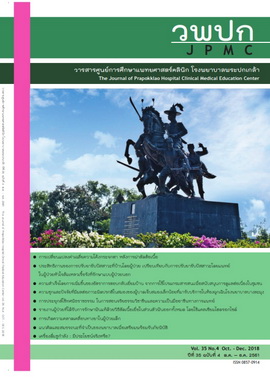Medication Errors in Pediatrics
Main Article Content
Abstract
Medication error (ME) is defined as “any preventable event that may cause or lead to inappropriate medication use or patient harm while the medication is in the control of health care professionals or patients. Such events may be related to professional practice and all treatment procedures”. It has been reported that the ME rate for pediatrics tends to be higher than for adults. Most MEs occur at the prescription step and typically involve wrong dosage and omission, which were found to be the most common errors in this step. Minerals and electrolytes are associated with the most frequent errors, while injection has the highest error rate in terms of method of administration. Most MEs were in category B for severity. The most significant source of MEs was due to health professionals. The most effective solutions for preventing MEs involve having a 24-hour, ward-based clinical pharmacist and improving communication among health professionals. However, MEs may not be able to be prevented by any single intervention; a combination of several interventions, including technology, can more effectively prevent MEs.
Article Details
References
1. World Health Organization. Medication Errors:Technical Series on Safer Primary Care. 2016.
2. Simpson J, Lynch R, Grant J, Alroomi L. Reducing medication errors in the neonatal intensive care unit. Arch Dis Child Fetal Neonatal Ed. 2004;89(6):F480-F2.
3. Kaushal R, Bates DW, Landrigan C, McKenna KJ, Clapp MD, Federico F, et al. Medication errors and adverse drug events in pediatric inpatients. JAMA. 2001;285:2114-20.
4. Fortescue EB, Kaushal R, Landrigan CP, McKenna KJ, Clapp MD, Federico F, et al. Prioritizing strategies for preventing medication errors and adverse drug events in pediatric inpatients. Pediatrics. 2003;111:722-9.
5. Zakharov S, Tomas N, Pelclova D. Medication errors: an enduring problem for children and elderly patients. Ups J Med Sci. 2012;117:309-17.
6. Stucky E. Prevention of medication errors in the pediatric inpatient setting. Pediatrics. 2003;112:431-6.
7. Keerati-Urai S. Pharmaceutical care in multidisciplinary team in pedriatric ward at Maharat Nakornratchasima hospital. [dissertation]. Bangkok: Chulalongkorn University; 2003. 149 p.
8. Bhumibhamon N, Montakantikul P, Sangtawesin V, Suksomboon N. Study of Medication Reconciliation Process in Pediatrics Medical Wards at Queen Sirikit National Institute of Child Health. Thai Pediatric Journal. 2012;19(1):23-30.
9. Hartzema AG, Porta MS, Tilson HH, Jonville A-PE, Autret E, Bavoux F, et al. Characteristics of medication errors in pediatrics. Dicp. 1991;25:1113-8.
10. Hartwig SC, Denger SD, Schneider PJ. Severity-indexed, incident report-based medication error-reporting program. American journal of hospital pharmacy. 199;48:2611-6.
11. Pongsakul C, Pajaree T. Health Information Technology and Patient Safety. Srinagarind Med J. 2012;27:24-6.
12. Thawithangkul S, Thawithangkul W, Wananukul W. Benefits and obstacles of computerized physician order entry (CPOE) system in Ramathibodi Hospital. J Am Med Inform Assoc. 2016;2:128-33.
13. Institue for population and social research Mahidol University. Medical and public health personnels [internet]. 2017 [cited 2018 Feb 17]. Available from: https://www.thaihealthreport.com/index2560-10.
14. American Geriatrics Society. Updated Beers Criteria for Potentially Inappropriate Medication Use in Older Adults. J Am Geriatr Soc. 2015;63:2227-46.
15. O'Mahony D, O'Sullivan D, Byrne S, O'Connor MN, Ryan C, Gallagher P. STOPP/START criteria for potentially inappropriate prescribing in older people: version 2. Age Ageing. 2015;44:213-218.

